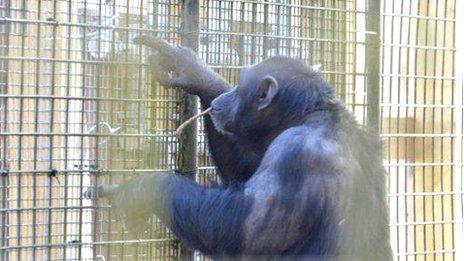Whipsnade Zoo research shows chimpanzees 'solve puzzles for fun'
- Published

Chimpanzees at Whipsnade Zoo did the puzzles regardless of whether or not they got a reward
Chimpanzees enjoy trying to solve brainteasers, according to research done at Bedfordshire's Whipsnade Zoo.
Scientists set up a game for six chimps that involved moving red dice through pipes until they fell into a container.
The same task was also carried out using brazil nuts instead of dice, so that success led to a treat.
However, the Zoological Society of London found the apes enjoyed getting stuck into a puzzle, with or without the opportunity to win a prize.
The chimpanzees, all members of an adult family group at the zoo, had to prod sticks into holes in the pipes to change the direction of the dice and get them to fall in the right place.
They did not receive advance training on how to play the game and the scientists said the apes were given complete freedom whether or not to pit their wits in the puzzle.
'Feel-good reward'
Researcher Fay Clark, from the society, said they noticed the chimps were "keen to complete the puzzle" for its own sake, regardless of whether or not they received a food reward.
"This strongly suggests they get similar feelings of satisfaction to humans who often complete brain-games for a feel-good reward," she said.
"For chimps in the wild, this task is a little bit like foraging for insects or honey inside a tree stump or a termite mound, except more challenging because the dice do not stick to the tool."
Researchers created higher "levels" of challenge by connecting many pipes together, and making them opaque so the dice or nuts could only be glimpsed through small holes.
The findings are published in the March edition of the American Journal of Primatology.
- Published15 January 2013